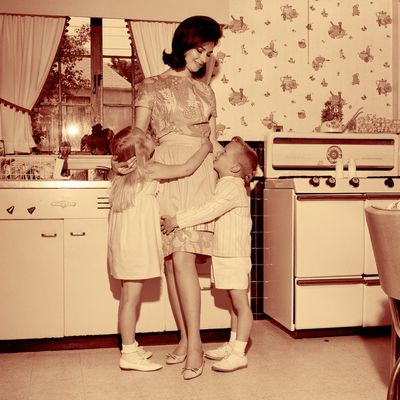
Even though research has shown that most parents show preferential treatment to one kid over the others, few mothers will willingly admit that they actually like one child the most. And absent a parental confession, siblings will often use their own accomplishments as a way of sussing out the favorite: Who got into a fancy grad school or landed a big promotion? Who made perfect college grades or just finished another marathon ? Who, in short, is the most brag-worthy member of the family?
It’s a sensible strategy, but new research shows that it also just might be a useless one. According to a paper published in the August issue of The Journal of Marriage and Family, most mothers don’t just feel closer to one child — they also rarely waver in that closeness, meaning there’s not much that adult children can do to sway things in their favor.
The study authors interviewed 381 older mothers with at least two living adult children. They also recorded demographic information about the children and mothers, looking for factors predicting the strength of emotional bonds between mother and child. The strongest predictor of closeness, they found, was whether a child shared the mother’s values — things like religious beliefs, for example, or an aversion to divorce. Shared values even beat out considerations like a child’s education level, geographic distance, and whether a child had cared for a mother when she was sick.
“[They might say] ‘I’m the one who finished college,’ ‘I’m the one who went to law school,’ or ‘I’m the one who just made partner,’” says lead study author Jill Suitor, a sociologist at Purdue University. “Conversely, a child might drop out of high school. But moms put up with a lot in adult children, and it doesn’t affect who moms are emotionally close to.”
The team also uncovered a special relationship between mothers and daughters — mothers were almost three times as likely to identify a daughter, rather than a son, as the child they were emotionally closest to. But they were also twice as likely to say they had the most conflict with a daughter, which Suitor says could be explained by gendered parental expectations: Daughters are more often conditioned to view themselves as part of their parents’ family, even in adulthood, while sons might be conditioned to emphasize adult independence. Daughterly closeness, in turn, could precipitate more conflict.
Emotional closeness is distinct from pride, the team noted. For example, the mothers in their study were more likely to be proudest of a child with a higher level of education, and more likely to be disappointed in a child they believed engaged in “deviant behavior.” But achievements or struggles in adulthood had little bearing on the mothers’ emotional closeness, and previous research shows this bond doesn’t change much with time (possibly because more influential factors like values infrequently shift in adulthood).
When children perceive maternal favoritism, the preference can strain bonds with siblings. But if you’re feeling resentful because there’s not much you can do to get yourself into first place, consider that such closeness has a downside. Suitor says when mothers reach old age, the children they’re most emotionally close to are more likely to experience depression, perhaps because they’re most affected by watching their mothers’ health decline.
On the other hand, if you’re closest to your mom, congratulations! There’s not much you can do to mess that up.




